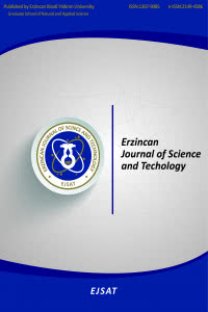Tepsili Bir Kurutucuda Kırmızı ve Yeşil Elma Parçacıklarının Kurutma Performanslarının Karşılaştırılması
: Gıda kurutma, Tepsili kurutucu, Kırmızı elma, Yeşil elma, nem içeriği
A Comparison of Drying Performances of Red and Green Apple Particles in a Tray Dryer
Food drying, Tray dryer, red apple, green apple, Moisture content.,
___
- N. Colak and A. Hepbasli, “Performance analysis of drying of green olive in a tray dryer,” J. Food Eng., 2007.
- A. Akbulut and A. Durmuş, “Energy and exergy analyses of thin layer drying of mulberry in a forced solar dryer,” Energy, 2010.
- E. A. Mewa, M. W. Okoth, C. N. Kunyanga, and M. N. Rugiri, “Experimental evaluation of beef drying kinetics in a solar tunnel dryer,” Renew. Energy, 2019.
- E. Özahi and H. Demir, “Drying performance analysis of a batch type fluidized bed drying process for corn and unshelled pistachio nut regarding to energetic and exergetic efficiencies,” Meas. J. Int. Meas. Confed., 2015.
- N. A. Aviara, L. N. Onuoha, O. E. Falola, and J. C. Igbeka, “Energy and exergy analyses of native cassava starch drying in a tray dryer,” Energy, 2014.
- J. A. Folayan, F. N. Osuolale, and P. A. L. Anawe, “Data on exergy and exergy analyses of drying process of onion in a batch dryer,” Data Br., 2018.
- ISSN: 1307-9085
- Yayın Aralığı: 3
- Başlangıç: 2008
- Yayıncı: Erzincan Binali Yıldırım Üniversitesi, Fen Bilimleri Enstitüsü
Gümüşhane İli İçin Bisiklet Ulaşımı Planlaması
Ultrases Yıkama İşleminin Meyve ve Sebzelerin Mikrobiyal Dekontaminasyonunda Kullanımı
Fatih Mehmet YILMAZ, Fulya OKUROĞLU, Ahmet Görgüç
Minkowski 3-Uzayında Tımelike Normalli Eğrilerin N-Bishop Çatısına göre Slant Helisleri
Hatice KUSAK SAMANCI, Ayhan YILDIZ
Arbutin’in yeni kaynakları: Onobrychis nitida and Onobrychis galegifolia
Hüseyin AKŞİT, Samed ŞİMŞEK, Volkan ÖZDOKUR, Ekrem KÖKSAL
Minkowski 3-Uzayında Timelike Normalli Eğrilerin N-Bishop Çatısına göre Slant Helisleri
Ayhan YILDIZ, Hatice KUŞAK SAMANCI
Dual Jacobsthal ve Dual Jacobsthal-Lucas Sedeniyonlar Üzerine
Dört Bacaklı Robot Üzerindeki Silah Kulesinin Stabilizasyon Simülasyonu
Farklı Hücre Dizilerinde 808 nm Laser Uygulaması ve DNA Sentezi
Fizik Biliminde Kullanılan Bazı Denklemlere Kudryashov Metodun Uygulanması
